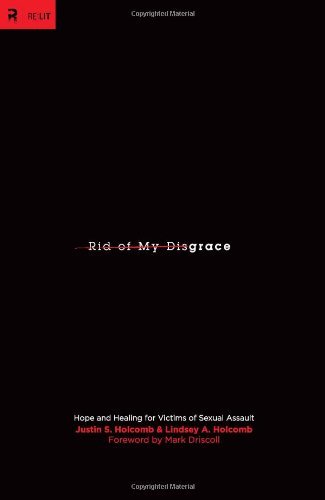Book Review: Rid of My Disgrace


Rid of My Disgrace: Hope and Healing for Victims of Sexual Assault, Justin S. Holcomb and Lindsey A. Holcomb, Wheaton: Crossway Books, 2011. Softcover, 268 pages, $16.99.
This is not a fun book to read. It’s not an enjoyable topic to think about. I have read far too many books on this subject and have encountered far too many people impacted by it. I pray it would go away. The first article I had published in Clarion dealt with sexual abuse. That was over 20 years ago. I want to believe that things have changed since then. I want to believe that sexual abuse no longer happens much and, in the rare case that it does, we deal with it in a biblical way – with compassion and grace. I want to believe that people who have been sexually abused get the help they need from the church in order to find healing and peace. But does wanting to believe something make it true? This lingering question is why I decided to read one more book on this horrible subject.
Some readers may be familiar with Mark Driscoll, pastor of Mars Hill Bible Church in Seattle, Washington. The authors, husband and wife, work with Driscoll at Mars Hill. Justin Holcomb is a pastor at the church and his wife Lindsey is a deacon. Justin also teaches theology at Reformed Theological Seminary in Jackson, Mississippi. As part of her work at Mars Hill, Lindsey provides counselling services to victims of sexual assault. Both authors are therefore well-qualified to address this difficult topic.
Definitions are crucially important here. The Holcombs are not interested only in addressing past or present childhood sexual abuse. They also address rape, spousal sexual assault, and other forms of sexual violence. Their definition of sexual assault: “any type of sexual behavior of contact where consent is not freely given or obtained and is accomplished through force, intimidation, violence, coercion, manipulation, threat, deception, or abuse of authority” (28). The definition is comprehensive and the authors expand on each element.
The book has three parts. The first speaks of the disgrace of sexual assault. The authors define it and speak about its effects. The second part goes into how grace can be applied to deal with the pain and trauma of sexual assault in the areas of denial, distorted self-image, shame, guilt, anger, and despair. A personal story from a survivor of sexual assault is included between each of the chapters in this section. The last part is entitled “Grace Accomplished.” Here the authors trace themes of sin, violence, sexual assault, and grace through the pages of the Bible.
There are many commendable elements to Rid of My Disgrace. The authors believe that the biblical gospel of grace is essential for healing. They have a biblical understanding of the dynamics of human sinfulness. Throughout the book, survivors of sexual assault are directed to the cross of Christ. Their approach to forgiveness is sound. They give a helpful analysis of why churches sometimes have a tendency to blame the victim, why we shoot our wounded. While the authors often use the results of scientific research and observations, their foundation is the infallible and inerrant Word of God. Moreover, the theological orientation of the authors is generally on the right track. The authors that a book cites are often revealing and Rid of My Disgrace prominently features John Calvin, Martin Luther, R. C. Sproul, and even the Heidelberg Catechism.
Good Christian books about this topic are hard to find. Many of them have more psychology than scriptural theology. That’s not a problem with this book at all. This is, in fact, one of the best Christian books available on sexual abuse. However, very reluctantly I have to point out one problem in the theology of the book. I do it reluctantly because I don’t want this problem to prevent people from reading it. On the other hand, I do want people to read it with discernment.
The problem has to do with their understanding of the cross. The Holcombs speak of God understanding abuse and assault, because Jesus was abused and assaulted. Taken by itself that statement could be taken charitably to mean that Jesus (the God-man) understands abuse and assault. However, the authors say far more. For example, on page 113 they say that when Jesus laid down his life as our substitute, “God is submitting to God’s own wrath for the sake of forgiving sinners.” This kind of language, often appearing with citations from less than orthodox theologians, appears especially in chapters 6 and 7. In QA 17 of the Heidelberg Catechism, we confess that Christ bore in his human nature the burden of God’s wrath. To state that God suffered on the cross may sound pastorally helpful and appealing, but it is theologically problematic. It is far better to keep the attention on Christ our High Priest and Mediator. Our Saviour Jesus understands abuse and assault – therefore, we can be comforted in our afflictions. We have a sympathetic High Priest to whom we can go with our burdens.
We should not underestimate the hurt that this sin has caused, also in terms of one’s relationship with God. The historic proliferation of this sin in some of our Canadian Reformed communities has damaged the faith life of many, both women and men. It has produced depression, mistrust, shame, hypocrisy, anger, broken marriages and families, and much more. Because it’s so damaging, we need to continue talking about it. Sin is like fungus: it grows best in the dark – it’s no different with the sin of sexual assault. Books such as this are helpful to shine the light and bring gospel hope and healing to those broken by this evil.


